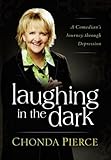 Not too long ago, after a series of financial challenges, I realized that I was suffering from a pretty severe depression. I looked up "clinical depression" on Wikipedia and a few other sites, and discovered that I was experiencing all of the classic signs of clinical depression with the exception that I was not gaining or losing weight, and I did not want to kill myself (I honestly wonder if the latter was the grace of God sparing me that turmoil). I immediately began to make plans to see my doctor, and then I promoted a book from my "read-it-someday" list to my "read it NOW" list: Laughing in the Dark: A Comedian's Journey through Depression by Chonda Pierce. I had watched one of Chonda's comedy DVDs a few months before, and I don't remember where I first heard that she had gone through a period of depression and written a book about it, but it may have been that DVD.
Not too long ago, after a series of financial challenges, I realized that I was suffering from a pretty severe depression. I looked up "clinical depression" on Wikipedia and a few other sites, and discovered that I was experiencing all of the classic signs of clinical depression with the exception that I was not gaining or losing weight, and I did not want to kill myself (I honestly wonder if the latter was the grace of God sparing me that turmoil). I immediately began to make plans to see my doctor, and then I promoted a book from my "read-it-someday" list to my "read it NOW" list: Laughing in the Dark: A Comedian's Journey through Depression by Chonda Pierce. I had watched one of Chonda's comedy DVDs a few months before, and I don't remember where I first heard that she had gone through a period of depression and written a book about it, but it may have been that DVD.Anyway, my episode of serious depression ended abruptly one Sunday during worship time at my church. I consider it a miracle healing; I was seriously depressed in a way I have never been before. There is being depressed, and there is clinical depression, and they are similar in name only... clinical depression is far beyond just being unhappy. But even though I believed I had received healing from the Lord (and I still do believe that and I still feel OK!) I went ahead and read the book anyway, and I was not disappointed. Chonda is open and honest about her experience, which was much worse than mine (she had physical symptoms that resembled a heart attack, and was medicated for many months afterward), but in every chapter she is able to add just enough humor to keep things light without becoming flippant. Every chapter focuses on something that was a major stage in her recovery... getting the diagnosis right, getting the medication right, getting back to work (as a depressed comedienne!), getting off her meds too early, and on and on. Each chapter ends with an email sent to Chonda by a fan who heard her talk about her ordeal from the stage, and then a few pages of more detailed information related to the chapter from a psychotherapist. I enjoyed all of the book, but I have two favorite parts. One of my two favorite parts is a section where Chonda learns that just like a sunset is still beautiful whether it affects you emotionally or not, God is still there whether you feel His presence or not (it's the last 8 pages of chapter 4). My other favorite part is a quote from a master of dry humor. This is the quote, which is the lead-in to chapter 8:
—Groucho Marx
I found the book enlightening, informative, encouraging, and enjoyable. (And every word in that list started with a vowel and the letter "n" woo-hoo!) I was able to identify with all but the worst of her symptoms, and I believe I have a much better understanding of serious depression than I ever had before, after experiencing my own short battle with it and reading about Chonda's longer battle.
I want to add a message to anyone reading this who has been in a depressed fog for more than a week or two. Don't wait to go see your doctor. If you have been depressed every day for all or most of the day for more than a couple of weeks, call right now and make an appointment. Don't be embarrassed, don't be nervous, and don't let yourself feel stigmatized. And don't put it off because you think you can handle it on your own. In recent years I have known two people who fell into the dark pit that had opened up inside of them and took their own lives, rocking the lives of their family and friends and, in one case, apparently inspiring the suicide of a loved one. Clinical depression is very treatable, either via counseling or medication or both, but if you don't see a professional you won't get the care you need. Don't play with your life; get help from someone. I know if I ever enter the fog again, I'll call my doctor right away. If you think you might be there but aren't sure, pick up a copy of Chonda's book. Her prologue description of the gray hotel with the "talking light" may help you get your mind around your own feelings and help you make the decision whether you need to seek treatment, or just a little bit of sunshine and your favorite song on the headphones. 




No comments:
Post a Comment